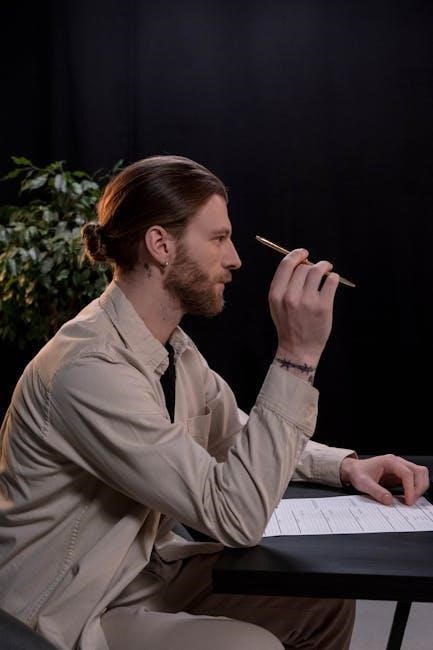In How to Do Nothing, Jenny Odell challenges the cult of productivity, advocating for intentional idleness as a form of resistance․ Her book offers a compelling guide to redefining value and reclaiming attention in a world dominated by the attention economy, urging readers to embrace stillness and deepen their connection with the world․
Overview of the Book’s Main Theme
Jenny Odell’s How to Do Nothing explores the concept of resistance against the attention economy, arguing that reclaiming attention is a radical act․ The book challenges the capitalist narrative of constant productivity, proposing that “doing nothing” is not inertia but a deliberate choice to engage deeply with the world․ Odell emphasizes the value of stillness, observation, and non-productive activities as means to reconnect with oneself and the environment, offering a powerful critique of modern society’s obsession with efficiency and distraction․
The Relevance of “Doing Nothing” in the Digital Age
In the digital age, where constant connectivity and endless distractions dominate, the concept of “doing nothing” becomes increasingly vital․ Jenny Odell argues that reclaiming attention and embracing intentional idleness are acts of resistance against the commodification of time and experience․ By opting out of the endless cycle of productivity and consumption, individuals can foster deeper connections with the world, cultivate creativity, and challenge the systems that exploit human attention for profit․ This idea resonates deeply in a society overwhelmed by technology and the pressure to always be “on․”
Jenny Odell’s Background and Expertise
Jenny Odell is a multidisciplinary artist, writer, and educator known for her nuanced exploration of technology, nature, and culture․ With a background in visual art, she brings a unique perspective to the intersection of creativity and critique․ Odell’s expertise lies in her ability to critically examine the impact of digital distractions on modern life, offering insightful solutions through her work․ Her writing is both personal and philosophical, making her a compelling voice in the conversation about redefining productivity and value in the digital age․

Understanding the Attention Economy
The attention economy refers to the commodification of human attention, where technology exploits our focus for profit, fostering distraction and eroding meaningful engagement with the world․
Definition and Mechanisms of the Attention Economy
The attention economy refers to the commodification of human attention, where digital platforms exploit user focus for profit․ Mechanisms include algorithms, notifications, and endless scrolling, designed to capture and retain attention․ This system thrives on data collection, targeting users with personalized content to maximize engagement․ As a result, individuals are conditioned to value productivity over presence, fostering a culture of distraction and reducing attention spans․ The attention economy perpetuates a cycle of consumption, leaving users feeling depleted and disconnected from meaningful experiences․
The Role of Technology in Shaping Attention
Technology plays a pivotal role in shaping attention by designing platforms that prioritize engagement over depth․ Apps and devices use algorithms to capture and retain user focus, often through endless scrolling and personalized notifications․ This creates a culture of constant distraction, where attention is fragmented and fleeting․ By leveraging psychological mechanisms, technology keeps users hooked, undermining the ability to engage deeply with the world․ The result is a society where focus is increasingly fleeting, and meaningful connection becomes elusive in a sea of digital stimuli․
Capitalism’s Influence on Productivity and Distraction
Capitalism perpetuates a culture of relentless productivity, framing time as a commodity to be constantly optimized․ This mindset fosters distraction, as individuals are pressured to multitask and consume information rapidly․ The pursuit of efficiency and profit drives technologies that fragment attention, creating a society where deep focus becomes increasingly rare․ By valuing productivity above all else, capitalism discourages introspection and connection, pushing people toward constant activity․ This ethos underpins the attention economy, where distraction is not just a byproduct but a deliberate design choice to keep individuals engaged and exploitable․

The Concept of “Doing Nothing”
Jenny Odell defines “doing nothing” as a transformative act of resistance against the attention economy, emphasizing mindfulness, creativity, and a deeper connection with the world․
Re-defining Productivity and Value
Jenny Odell challenges traditional notions of productivity, arguing that value should not be tied solely to economic output․ She advocates for a shift in perspective, where productivity is measured by the depth of connections, creativity, and fulfillment rather than constant busyness․ By redefining value, individuals can reclaim their time and attention, prioritizing activities that foster personal growth and meaningful engagement with the world, rather than those driven by capitalist ideals of efficiency and profit․
The Power of Intentional Idleness
Intentional idleness, as explored in How to Do Nothing, is not mere laziness but a deliberate act of resistance․ By choosing to step away from constant productivity, individuals reclaim their agency, allowing space for reflection, creativity, and deeper engagement with their surroundings․ This practice counters the Attention Economy’s commodification of time, fostering a sense of fulfillment and connection that emerges from stillness and presence, rather than endless activity․
Historical Examples of Resistance Through Inaction
Throughout history, resistance through inaction has been a potent strategy․ Old Survivor, a redwood tree spared from logging due to its impracticality, symbolizes passive defiance․ Similarly, oppressed groups have employed subtle acts like foot-dragging or sabotage to resist exploitation․ These actions, rooted in refusal to conform, challenge systemic oppression without direct confrontation․ By doing nothing, individuals and communities have historically asserted their agency, proving that stillness can be a powerful form of resistance against oppressive systems and ideologies․

Benefits of Doing Nothing
Doing nothing fosters mental clarity, creativity, and genuine connections․ It allows individuals to recharge, reflect, and engage deeply with their surroundings, promoting overall well-being and fulfillment․
Mental Health and Well-being
Doing nothing offers profound benefits for mental health, reducing stress and anxiety by allowing the mind to rest․ Intentional idleness fosters mindfulness, helping individuals reconnect with their thoughts and emotions․ In a world that glorifies constant productivity, doing nothing becomes an act of self-care, promoting emotional balance and well-being․ By stepping away from the pressures of the attention economy, individuals can cultivate a sense of calm and clarity, essential for nurturing mental health and rebuilding a sense of purpose and fulfillment in life․
Enhancing Creativity and Deep Thinking
Doing nothing cultivates creativity and deep thinking by allowing the mind to wander freely․ Without the constant distractions of the attention economy, individuals can engage in introspection and exploration․ This mental space fosters innovation and problem-solving, as the brain is given the freedom to connect ideas in new ways․ By embracing idleness, people can tap into their creative potential, leading to fresh insights and meaningful contributions to their personal and professional lives․
Building Deeper Connections with the World
Doing nothing fosters deeper connections by allowing individuals to engage fully with their surroundings․ By stepping away from distractions, people can observe and appreciate the intricate details of the world around them․ This mindful engagement nurtures empathy and understanding, helping to rebuild social bonds and a sense of community․ Odell emphasizes that meaningful connections emerge when we value presence over productivity, creating a richer, more authentic relationship with the world and its inhabitants․

Practical Steps to Implement “Doing Nothing”
Cultivate self-awareness, limit digital distractions, and engage in non-productive activities to foster deeper connections and resist the attention economy’s pull․
Self-Awareness and Mindfulness Practices
Self-awareness is crucial for reclaiming attention․ Practice mindfulness to notice where your focus is drawn, resisting distractions and value-based thinking․ This helps cultivate intentionality, allowing you to engage deeply with your surroundings․ By becoming more aware of your mental habits, you can redefine productivity and prioritize what truly matters․ Mindfulness exercises, such as observing silence or nature, foster a deeper connection to the world, countering the attention economy’s fragmentation․ Over time, this practice enhances mental clarity and encourages meaningful engagement with life․
Limiting Digital Distractions
Reducing digital distractions is essential for reclaiming attention․ Set boundaries by limiting app usage and creating tech-free zones․ Regularly assess which technologies serve your values․ By unplugging from the attention economy, you create space for intentional idleness and deeper engagement with the world․ This practice, as Jenny Odell suggests, allows you to redirect focus toward meaningful activities, fostering a sense of fulfillment and connection; Embracing these limits helps combat the constant pull of digital distractions, enabling a more mindful and present way of living․
Engaging in Non-Productive Activities
Engaging in non-productive activities is a powerful way to resist the attention economy․ By dedicating time to hobbies, nature, or simply observing your surroundings, you reclaim your attention․ These activities, void of monetary value, allow for deeper connections and personal growth․ Jenny Odell emphasizes that such practices challenge capitalist narratives, fostering a sense of fulfillment beyond productivity․ Embracing these moments of intentional idleness helps cultivate mindfulness and appreciation for the world’s inherent value, enriching your life in ways that transcend economic measures of success․

Challenges and Criticisms
Critics argue that “doing nothing” may seem privileged or impractical for those with limited resources․ Some view it as a temporary escape rather than a systemic solution, while others critique its alignment with capitalist values, questioning its broader impact․ Additionally, the concept of quiet quitting has sparked debates about its implications on productivity and workplace culture, highlighting the tension between resistance and responsibility in modern society․
Addressing Criticisms of the Concept
Some critics argue that “doing nothing” is a privileged stance, inaccessible to those with fewer resources․ Odell counters by emphasizing that resistance lies in non-participation, not passivity․ She acknowledges the systemic challenges but frames intentional idleness as a political act, challenging capitalist narratives of productivity․ Critics also question its practicality, but Odell argues that redefining value and attention can lead to meaningful change․ By advocating for stillness, she encourages a broader reevaluation of how society measures worth, offering a path to resilience in a hyper-consumerist world․
Overcoming Societal Pressures
In a society that equates productivity with worth, embracing “doing nothing” requires confronting deep-seated cultural norms․ Odell argues that societal pressures to constantly produce stem from capitalist ideologies that commodify time and attention․ To resist these pressures, individuals must shift their mindset, recognizing that value lies in connection and context, not productivity․ By prioritizing intentional idleness, people can reclaim their time and attention, challenging the notion that busyness equals success․ This radical shift enables individuals to redefine their relationship with work and leisure, fostering a more meaningful engagement with the world․
Balancing Doing Nothing with Modern Responsibilities
While embracing the concept of “doing nothing” is transformative, it must coexist with modern responsibilities․ Odell suggests that redefining productivity doesn’t mean abandoning obligations but rather integrating moments of intentional idleness․ By setting boundaries and prioritizing what truly matters, individuals can cultivate a healthier relationship between work and rest․ This balance allows for deeper focus on essential tasks while preserving time for reflection and connection, ultimately enriching both personal and professional life without succumbing to burnout or distraction․

Real-World Applications
Jenny Odell’s philosophy is exemplified through practices like “quiet quitting” and temporary digital detoxes, offering practical ways to resist the attention economy and reconnect with meaningful experiences․
The Rise of “Quiet Quitting”
Quiet quitting, a trend where individuals stop exceeding job expectations, reflects Jenny Odell’s ideas by redefining productivity․ It applies her principles of reclaiming attention during work, encouraging boundaries and rejecting overextension․ This shift challenges capitalist notions of value, sparking debate․ While some see it as a positive move toward work-life balance, others criticize it as a lack of commitment․ The trend highlights broader societal reevaluations of work’s role, aligning with Odell’s resistance against relentless productivity pressures, promoting a healthier approach to employment and life․
Temporary Detoxes and Retreats
Jenny Odell critiques temporary detoxes and retreats as insufficient solutions to the attention economy․ While they offer a break from digital overload, they fail to challenge the underlying mindset that equates productivity with value․ These retreats often become part of the wellness industry, which commodifies relaxation and perpetuates the same economic systems they aim to escape․ Odell argues for more profound systemic change, emphasizing that true resistance requires a shift in how we view and use our time and attention beyond fleeting escapes․
Case Studies of Successful Implementation
Jenny Odell highlights real-world examples where “doing nothing” has proven impactful․ The story of Old Survivor, a centuries-old redwood spared from logging due to its impracticality, illustrates resistance through inaction․ Additionally, the rise of “quiet quitting” shows how individuals reclaim their time and attention in the workplace, embodying Odell’s principles․ These case studies demonstrate how stepping back from productivity-driven norms can lead to meaningful change, both historically and in contemporary contexts, offering practical inspiration for those seeking to redefine their relationship with work and leisure․

The Role of Solitude and Observation
Solitude and observation are powerful tools for fostering awareness and connection in a distracted world; By embracing stillness, one can deeply engage with their surroundings, fostering meaning and insight․
Learning to Appreciate Silence
Learning to appreciate silence is a radical act in a world dominated by noise and distractions․ Silence, as Gordon Hempton notes, is not the absence of something but the presence of everything․ It allows us to tune into the subtle details of our surroundings, fostering a deeper connection with the world․ In a culture that equates busyness with value, embracing silence becomes a form of resistance․ By quieting the mind and slowing down, we reclaim the ability to observe, reflect, and engage meaningfully with our environment, countering the relentless pull of the attention economy․
The Importance of Observation in a Distracted World
In a world consumed by distractions, observation becomes an act of resistance․ By slowing down and truly noticing, we counter the attention economy’s pull․ Observation fosters a deeper understanding of context and interconnectedness, allowing us to see beyond surface-level distractions․ It encourages us to engage meaningfully with our surroundings, breaking down the atomization caused by constant noise․ Through intentional observation, we reclaim the ability to connect with the world on a more profound level, enriching our lives and challenging the norms of a hyper-distracted society․
Art and Ecology as Tools for Reflection
Art and ecology serve as powerful tools for reflection, offering a counterbalance to the attention economy’s relentless pace․ Through art, we engage in non-productive yet meaningful practices that spark deep thinking․ Ecology, in turn, encourages a connection with nature, fostering a sense of wonder and appreciation for the world’s complexity․ Both art and ecology invite us to pause, observe, and reflect, helping us reevaluate our priorities and reconnect with what truly matters․ They provide a space for introspection, challenging us to see value beyond productivity and efficiency․

Social and Cultural Implications
How to Do Nothing challenges capitalist narratives, advocating for a cultural shift where value is found in connection and reflection rather than productivity, fostering deeper community ties․
Resisting Capitalist Narratives
In How to Do Nothing, Jenny Odell critiques the capitalist mindset that equates self-worth with productivity․ By embracing intentional idleness, individuals resist the exploitation of their attention and time, challenging the notion that value lies in constant activity․ Odell argues that this resistance fosters a deeper connection to the world, encouraging a shift from profit-driven narratives to a culture that values community, creativity, and well-being․ Historical examples, like the survival of Old Survivor, illustrate how non-participation can be a powerful act of defiance against systems prioritizing productivity over preservation․
Community Building Through Shared Inaction
Jenny Odell highlights how shared inaction can foster community and solidarity․ By collectively resisting the pressure to constantly produce, individuals create space for meaningful connections and mutual support․ Shared inaction becomes an act of defiance against social atomization, encouraging people to engage with one another on a deeper level․ This collective approach to doing nothing strengthens community ties, fostering a sense of belonging and shared purpose․ It also challenges the capitalist narrative that isolates individuals through relentless productivity, promoting instead a culture of collaboration and care․
The Future of Work and Leisure
Jenny Odell envisions a future where work and leisure are redefined beyond capitalist productivity․ By reclaiming attention and valuing non-productive activities, individuals can foster a more balanced and fulfilling relationship between work and personal time․ This shift challenges the notion of constant busyness, promoting a society where leisure is not just a temporary escape but an integral part of a meaningful life․ Odell suggests that embracing intentional idleness can lead to a cultural transformation, where both work and leisure are centered on connection, creativity, and well-being rather than profit and efficiency․

Environmental and Ethical Considerations
Doing nothing fosters sustainability by resisting exploitation, conserving resources, and valuing stillness․ Old Survivor, a symbol of quiet resistance, embodies the ethical act of non-participation in harmful systems․
Conservation and Sustainability
Jenny Odell highlights the connection between doing nothing and environmental conservation, emphasizing the value of stillness in preserving natural resources․ By resisting the urge to constantly act, we allow ecosystems to thrive without interference․ The concept of Old Survivor, a redwood tree that endured by being deemed worthless to loggers, illustrates how non-participation can paradoxically preserve․ Doing nothing encourages a deeper appreciation for nature’s inherent processes, fostering sustainability by prioritizing observation over exploitation․ This mindset aligns with ethical conservation, promoting a world where inaction becomes a powerful tool for environmental stewardship and resilience․
The Ethics of Non-Participation
Jenny Odell explores the ethical dimensions of non-participation, framing it as a deliberate act of resistance against systems that exploit attention and labor․ By choosing to step back, individuals challenge capitalist narratives that equate self-worth with productivity․ This ethical stance questions the value assigned to constant activity, advocating instead for a mindful withdrawal that preserves autonomy․ Odell illustrates this through the story of Old Survivor, a redwood tree that endured by being deemed worthless to loggers, symbolizing how non-participation can become a powerful, ethical form of resistance․
Old Survivor as a Symbol of Resistance
Old Survivor, the last old-growth coastal redwood in Oakland, embodies the power of resistance through non-participation․ Once deemed too small and gnarled for logging, it endured while others perished, symbolizing how refusing to fit into systems of exploitation can be an act of defiance․ Jenny Odell uses this tree to illustrate how non-participation—doing nothing in the eyes of capitalism—can preserve autonomy and resilience․ By existing outside the logic of productivity, Old Survivor stands as a living testament to the strength of quiet, unyielding resistance in a world driven by exploitation and efficiency․
In How to Do Nothing, Jenny Odell inspires readers to reclaim their attention and challenge the attention economy․ Embrace intentional idleness and redefine productivity to live more deeply connected lives․
Summarizing the Key Takeaways
Jenny Odell’s How to Do Nothing urges readers to resist the attention economy by embracing intentional idleness․ By redefining productivity and valuing non-monetary activities, individuals can deepen connections with the world, enhance creativity, and improve mental well-being․ Odell emphasizes the importance of self-awareness, mindfulness, and limiting digital distractions to reclaim attention․ Her call to action encourages a shift from capitalist-driven efficiency to a more meaningful, engaged way of living, fostering deeper context and community․ This book offers a powerful manifesto for reclaiming life’s value beyond productivity․
Encouraging Readers to Reclaim Their Attention
Odell empowers readers to reclaim their attention by shifting focus from productivity to presence․ She advocates for intentional idleness, urging individuals to disengage from capitalist-driven distractions and reconnect with their surroundings․ By prioritizing self-awareness and mindfulness, readers can resist the attention economy and cultivate deeper connections․ This mindset transformation allows individuals to value moments of stillness and observation, fostering creativity and well-being․ Odell’s call to action inspires a movement toward a more meaningful, engaged life, where attention becomes a powerful tool for personal and societal change․
Resources for Further Exploration
For deeper insights, explore the How to Do Nothing PDF guide, offering practical steps and examples like Old Survivor’s resistance․ Discover discussions on quiet quitting and community-driven inaction․ The book also delves into art and ecology as reflective tools, providing a holistic view of reclaiming attention․ Additionally, resources like Shortform’s summary and critiques of the wellness industry offer complementary perspectives, enriching your understanding of Odell’s transformative ideas․
